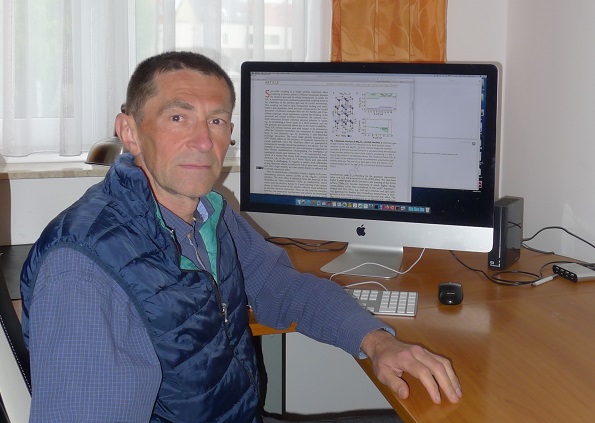The JKU is involved in a new international research project that aims to explore nanomaterial spin waves.

In an effort to create a new generation of transistors - and ultimately a new generation of computers - new theories and new experiments are required.
Together with research institutions in Hamburg and Halle, Prof. Arthur Ernst (Institute for Theoretical Physics at the JKU) is focusing on a search to find "non-collinear spin structures in pure and rare earth doped ultrathin ferrites". In this case, spins represent tiny magnets that readily align parallel to these ferrites. Ultrathin layers contain deviating (so-called non-collinear) arrangements and this is raising interesting new questions: How do electrons react on surfaces and on thin films? How can they change their magnetic properties? Ferrites, materials belonging to the iron oxide family, are particularly well-suited for this purpose, along with rare earth metals in lieu of their extremely strong magnetic properties.
Small and sustainable
Researchers hope to synthetically manufacture new materials that could take current computer technology to the next level as electron spin waves can be magnetically manipulated without electricity. This creates potential, reliable electronic circuits that are much smaller than those found in computers today. In addition, these kinds of circuits would also be much more environmentally friendly to manufacture, meaning they could be part of a "green electronics" system.
The research project is tremendously complex. In addition to "conventional" problems when it comes to reliably conducting nanoscale research, scientists have to create tiny samples enriched with rare earth metals and then examine these samples to determine their crystalline and magnetic properties. This is where theorists and experimentalists work in tandem.
Prof. Ernst explained: "We have two experimental teams; at the JKU, we have Prof. Andreas Ney (Department of Solid-State Physics) and in Halle, we have Dr. Katayoon Mohseni (Max Planck Institute). We don’t want the scientists to fly blind so we need a new, solid theoretical foundation." He and his team aim to provide the foundation together with Prof. Pawel Buczeck (University of Hamburg). "First, we will use computer simulations to calculate suited materials. We will synthesize the most promising materials and then, as part of a series of experiments, we will study them intently."
The amount of computing power needed is enormous. Prof. Ernst added: "Don’t think of it as a simple program that can run on a standard computer because especially in physics – but in other fields as well - we are now moving into advanced areas that require the use of ultra-modern and extremely high-power computers." Institutes can no longer perform these kinds of highly complex calculations on their own and require the use of high-performance computers that are jointly owned and operated by several universities and institutions.
The topic is very much in high demand and Prof. Ernst will soon publish a paper in the highly prestigious journal “Advanced Materials” about magnetic vortices in ferromagnets that also require the use of supercomputers to perform calculations. A similar article about exchange scaling ultrafast angular momentum transfer in 4f antiferromagnets was recently published in Nature Materials.








